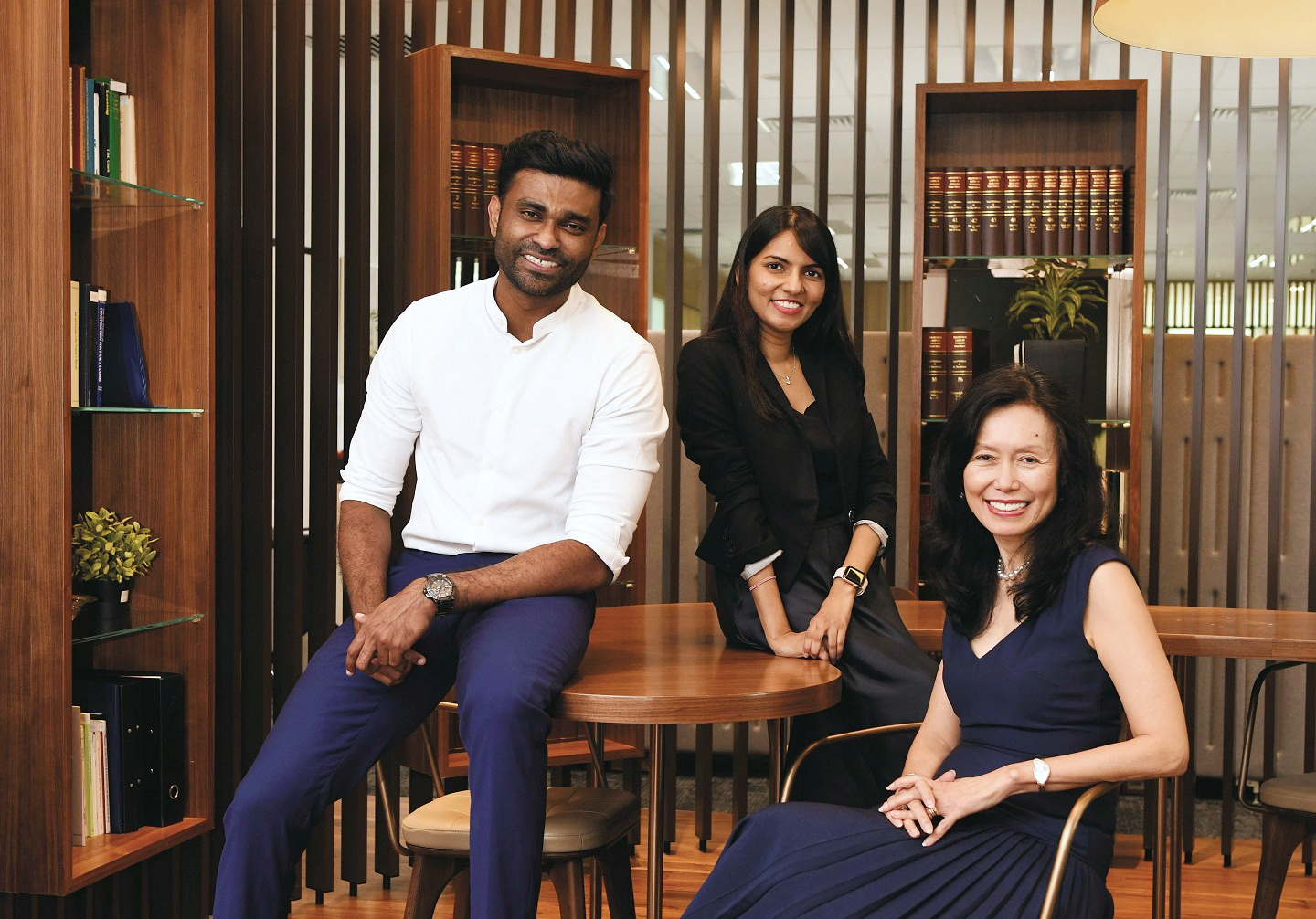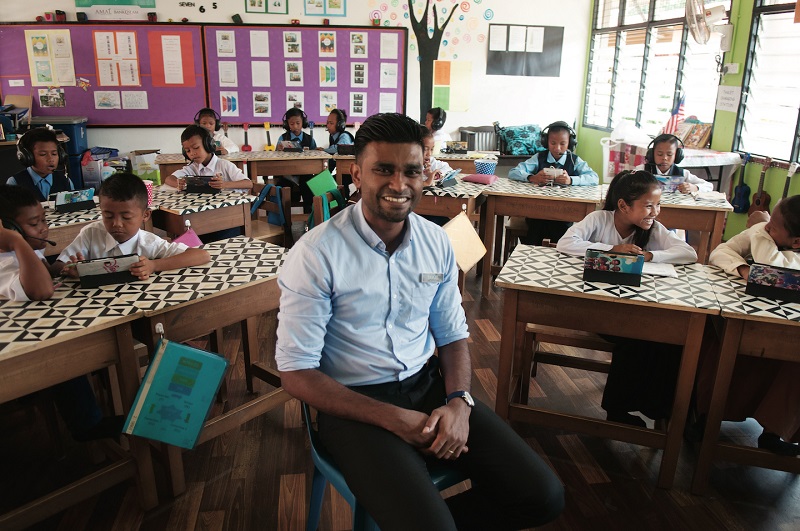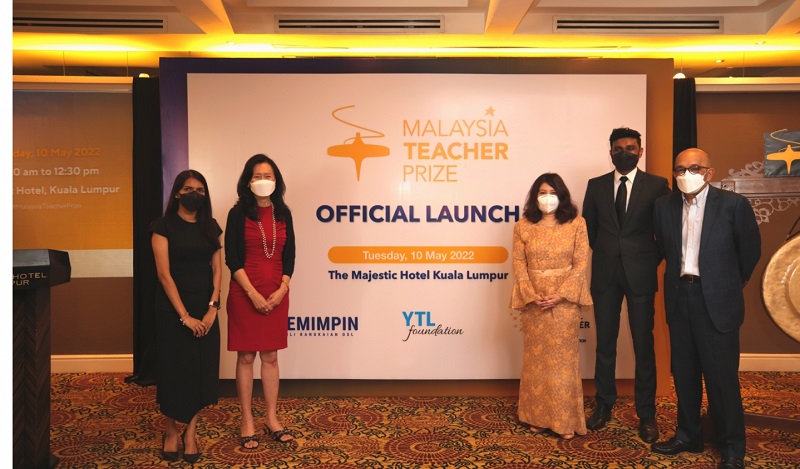
From left: Samuel Isaiah, Cheryl Ann Fernando and Datuk Kathleen Chew (Photo: Low Yen Yeing/The Edge Malaysia)
In 2020, Samuel Isaiah made Malaysia proud when he was selected as one of the 10 finalists of the Global Teacher Prize, dubbed the Nobel Prize of the teaching fraternity. The prestigious US$1 million reward by the Varkey Foundation is presented annually to an exceptional teacher who has made an outstanding contribution to his or her profession, with funds also disbursed to the finalists to continue their good work.
Two years later, Pemimpin GSL in partnership with YTL Foundation is launching a local edition of this prestigious award, the Malaysia Teacher Prize, to celebrate teachers whose exceptional efforts in educating young minds are often unseen and unrecognised.
The award seeks to raise the status of Malaysian teachers and celebrates the achievement of outstanding educators in the country. It is also the first of its kind here to honour teachers on a national level with a long-term professional development plan and generous prize money for those shortlisted.
The award is aimed at reaching 10,000 teachers across the country. The grand prize winner will receive RM50,000 while the four other finalists, RM5,000 each. Besides this, the top 10 finalists will also receive professional development to help them better understand their impact and potentially scale their work beyond their schools. Applications for the Malaysia Teacher Prize is open to currently working teachers in Malaysia and will run until June 30. The shortlist is expected to be unveiled in August while the top five and grand prize winner will be announced in October.
“Last year, we started talking to the Varkey Foundation about the competition space in Malaysia and how we could showcase local teachers and the innovations that they were employing in their classrooms,” says Pemimpin GSL CEO Cheryl Ann Fernando. “Varkey didn’t have a local partner to bring the Global Teacher Prize to Malaysia, so that’s what we signed up to do. There are 40 countries which run this competition locally, and now we have joined them too.”
“In 2021, we actually started off with something smaller to not only put teachers in the limelight but also scale what they do in the classrooms,” adds Samuel. “We have seen in the course of the pandemic some of the good ideas that have come from these classrooms organically, so we looked for different ways to elevate the profession and add value to what was already being done. We saw this great idea in Sabah, for example, where a teacher taught coding to students without the use of computers — why are these stories not highlighted, and these examples not replicated? This is part of the motivation for bringing the Global Teacher Prize to Malaysia.”
samuel_inside.jpg

The YTL Foundation, which is behind the establishment of Pemimpin GSL based on a desire to fund a school leadership development programme, celebrates its 25th anniversary this year. Its sponsorship of the Malaysia Teacher Prize represents another milestone in its ongoing commitment to empower individuals and communities to be catalysts of change throug education.
“YTL Foundation has always believed that strong and effective school leadership is fundamental in transforming schools and classrooms and the Malaysia Teacher Prize is a wonderful opportunity to call out and recognise great teacher leaders,” says the foundation’s programme director Datuk Kathleen Chew. “YTL has supported Pemimpin GSL in its school leadership programme since its inception and we believe that this prize is a wonderful complement to its work.”
Although based on similar principles, the local and international editions of the Global Teacher Prize differ in several ways. First, the Malaysian prize is easier to apply for — submissions ask for four essays instead of 13 — and, second, and most critically, is the professional development coaching element for those shortlisted, which has a permanent impact on their teaching careers, and subsequently the lives of students. “We’ve run programmes in schools for many years, and it has been our mandate all this time — how we can promote better education. Definitely, one pathway is to empower teachers to do what they do best, so you have to find the best ones,” Chew says.
While home learning and having parents become part-time educators during the pandemic has renewed our sense of gratitude for the critical role teachers play, it also gave educators the opportunity to really showcase the breadth of their tenacity and creativity.
“Having been teachers pre-pandemic, Samuel and I can say it wasn’t easy — what more during that period. Teachers were really forced to innovate,” Fernando, a Teach for Malaysia alumnus, agrees. “A lot of them, especially in rural areas, really did everything they could to get homework to students and back, including erecting a guard post outside the school for pick-ups and drop-offs, or even bringing homework to kids’ homes, and teaching full lessons on WhatsApp and Telegram! This really proves Malaysian teachers are amazing — in fact some of the best in the world — and they should be recognised.”
While this remains a noble ideal, the overarching objective for the Malaysia Teacher Prize is much bigger — elevating the status of teachers and attracting greater talent into the profession. “This award will be a starting platform for teachers to share their stories, particularly how hard they have worked during the pandemic to adapt to changing circumstances and do their best to provide excellent learning experiences for students. In the long run, we hope this award serves as a motivation for teachers to continue improving student outcomes. We hope this will also encourage young people to see teaching as a profession of choice and sign up as teachers to further strengthen our education system.”
launch_pic.jpg

As a parent of seven children, Chew has dealt with more than her fair share of educators, both good and bad, and is well aware that quality school leadership is a critical component of nation building. This insight was what drove YTL Foundation’s support of Pemimpin GSL from 2017. By the following year it was able to run fellowship programmes with 22 school principals and assistants, and today, has expanded to include activities for individual teachers in a total of 800 schools across the nation. “We receive calls frequently requesting these programmes, so clearly word is spreading and it’s something the school leadership teams want and need,” Samuel observes.
Immediate measures of success do include better results from students, but what Pemimpin GSL is looking for is something a little different — teachers who are able to come up with localised and contextualised solutions for their students and school. “We lead them to a particular mindset,” Samuel says. “One of the key things we do is teach these school leaders how to support teachers in the classrooms to be better educators — that’s what we work on.” One of many success stories that the duo share is a Tamil school headmistress whose sole objective was to help her teachers teach better in the classrooms, and this resulted in a jump of pass rates from 2% to 48%.
These fellowships segue nicely into the Malaysia Teacher Prize, as they can practice what they learnt during the sessions with Pemimpin GSL — there are different ones for school leaders and junior level teachers — and publish success stories through the platform of the nationwide competition.
There is a three-year plan in place for the Malaysia Teacher Prize, depending on how things go this year. The target is 1,000 applications this year, 3,000 next year and 5,000 the following year. Each of the 10 finalists will also be recommended for the Global Teacher Prize and given the necessary support to put in their application.
“Teaching used to be considered a truly noble profession and it certainly still is, but I think it has become apparent that even teachers need help,” says Chew. “With that support, they have proven what they can do — we are elevating not just the calibre of the teachers but also that of the public school system in the country. Teach for Malaysia started out with this objective and has made an impact. Young people now don’t aspire to be teachers, which is not a desirable state of affairs — this is something we hope to reverse. In Finland, for example, the stature of teachers is so high. [Therefore,] elevating the profession and making it one of choice is what [will] make our education system stronger.”
For more information or to nominate someone for the Malaysia Teacher Prize, click here.
This article first appeared on June 20, 2022 in The Edge Malaysia.


